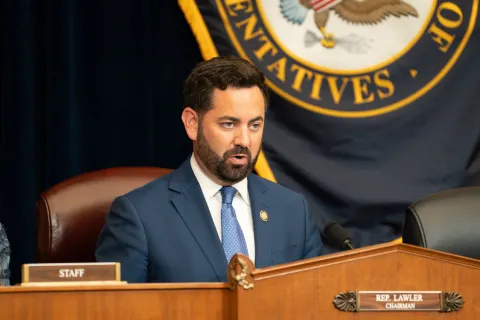Middle East and North Africa Subcommittee Chairman Lawler Delivers Opening Remarks at Hearing on State Department Bureau of Counterterrorism
WASHINGTON, D.C. – Today, House Foreign Affairs Middle East and North Africa Subcommittee Chairman Michael Lawler delivered opening remarks at a subcommittee hearing on the State Department’s Bureau of Counterterrorism FY26 Budget Posture.

-Remarks-
The subcommittee on the Middle East and North Africa will come to order. The purpose of this hearing is to assess the budgetary posture and strategic direction of the State Department’s Bureau of Counterterrorism for fiscal year 2026. I now recognize myself for an opening statement.
Today we convene to duck conduct oversight of the State Department’s Bureau of Counterterrorism and review its budgetary posture and strategic priorities for fiscal year 2026. I want to thank our witness acting coordinator for Counterterrorism, Gregory LoGerfo, for appearing before us today. The Bureau of Counterterrorism is a vital arm of America’s national security strategy. It plays a leading role in coordinating US counter-terrorism policy, engaging foreign partners to disrupt threats before they reach our shores, and supporting global efforts to confront terrorism in all its forms. From its role in special operations to diplomatic engagement to training programs, the bureau is on the front lines of protecting the American people. As terrorism threats are becoming more diffused, adaptive, and globally networked, we must ensure the Bureau is equipped to respond with agility, efficiency, and strategic foresight.
In the Middle East, this means confronting the malign influence of Iran backed proxy groups such as Hamas, Hezbollah, and the Houthis, while sustaining pressure on Isis whose presence in the region remains a serious concern. And it is with this background that we examine the Bureau of Counter Terrorism’s budget. During this hearing today, we will assess how the Bureau is delivering measurable security dividends for US taxpayers through its foreign assistance programming, particularly through its anti-terrorism assistance and the worldwide security program. We will also explore the extent to which the bureau’s budget requests will enable personnel to adapt to new geopolitical threats while maintaining coordination across the inter-agency and international partners. We must also consider whether the state department’s reorganization has impacted outcomes and how the bureau is responding to its expanded scope. We must determine if the State Department has the tools, authorities, and structure to preserve its capacity to respond to regional complexities. Finally, I want to emphasize that the effective counter-terrorism policy demands a strong partnership between Congress and the department that is granted in transparency, oversight, and shared strategic vision.
As we move toward reauthorization and review of the department’s fiscal year 2026 plan, this subcommittee is committed to ensuring that the Bureau of Counterterrorism has the resources and guidance it needs to remain a global leader in combating our world’s most dangerous threats. Mr. LoGerfo, we look forward to your testimony and to a robust discussion of how we can work together to safeguard the United States and our allies in an increasingly complex threat environment.
###